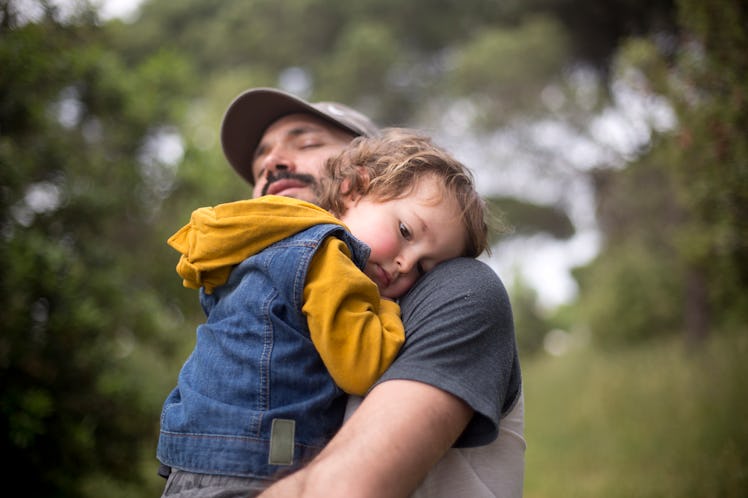Kids Feel Self-Conscious And Embarrassed Before Age 2, Studies Say
Young children are aware of how they're perceived earlier than previously thought.

Children may experience feelings of embarrassment much sooner than scientists previously thought. Kids start to care what other people think before they even reach their terrible twos, which is surprising, given how liberated they seem to be. But many experts agree that though a self-conscious toddler may not act the same way as a self-conscious parent, that doesn’t mean they do not experience it. They care what others think even if the diaper they rip off at the park says otherwise.
The main reason shame, embarrassment, and self-consciousness are so difficult to identify in toddlers is because they are more complex emotions that children are not developmentally capable of expressing yet. Scientists previously thought children didn’t become self-aware until the age of 4 or 5, mostly because that’s when they were able to start verbalizing it.
“Research shows that socially and emotionally, children begin to show shame when doing something wrong closer to 18 months of age,” says pediatrician Amna Husain, M.D. “It’s usually around 20 months of age that children begin to have thoughts about feelings, and by 24 months of age, they can begin to mask emotions for social etiquette.”
Recent data published by the American Psychological Association in the journal Developmental Psychology confirms toddlers’ capacity for embarrassment. In a series of four separate experiments on 144 children between 14- and 24-months-old, participants consistently demonstrated self-awareness of when they were being watched and behaved better compared to when they thought they were alone. When this was combined with positive and negative feedback, the effect was even more pronounced, suggesting that kids care about how they are seen in the same way adults do.
“I think that when we think of self-consciousness, we think of a very complex ability, which it can be, but it has many levels,” study co-author Sara Botto explains. Most people think all self-consciousness occurs at a level where people understand that they have an observable self, that others have opinions about that, and that those opinions could affect them — and that is not same plane toddlers on. They’re aware of and affected by what others think, but because they cannot express this, it’s difficult to know to what extent, Botto says. “While there is ample evidence that children display embarrassment by the age of 24 months, it is hard to know how they experience it,” she says.
Botto and Husain agree that toddlers are typically more self-conscious with strangers versus their parents, who they tend to be more comfortable testing boundaries with. So it makes sense why most moms and dads don’t see their 2-year-olds as modest because they don’t get to see that side of their kid.
Far less is known about why toddlers get embarrassed when there tend to be very few social consequences for their actions. Developmentally, this new sense of embarrassment seems to set in around the time young children become more social, yet experience a surge of stranger anxiety with adults. Part of this may be related to safety, but Botto suspects that toddler embarrassment is rooted in a need for acceptance as well.
“Research has shown that being rejected can literally be perceived as physical pain, and as humans, we have this inclination to be loved and accepted,” she says. “Being part of a group or family is essential to our survival in early development, and being part of a strong community is associated with a wealth of positive outcomes.”
The best thing parents can do if they sense their child is embarrassed is acknowledge it, but don’t overreact. It’s not the end of the world, and it might be the one thing you and your kid can relate on after a meltdown at the grocery store.
These findings are also yet another reason to treat kids — even those who are still practically babies — like emotional equals. They’re more perceptive than parents give them credit for.
“Praise positive skills and create perspective for your child when things don’t always go as planned,” Husain says. “You want to create a safe environment where children feel they will not be judged for what they deem as failures or embarrassments.”
This article was originally published on